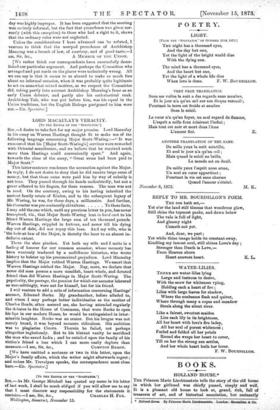LORD MACAULAY'S VERACITY.
[TO THE EDITOR OF THE "SPECTATOR."]
desire to take fact for my major premiss. Lord Macaulay in his essay on Warren Hastings thought fit to make use of the following language concerning Major Scott-Waring:—" It was rumoured that his [Major Scott-Waring's] services were rewarded with Oriental munificence, and we believe that he received much more than Hastings could conveniently spare." And again, towards the close of the essay, " Great sums had been paid to Major Scott."
This latter sentence condenses the accusation against the Major. In reply, I do not desire to deny that he did receive large sums of money, but that these sums were paid him by way of subsidy is not true. They passed through his hands undoubtedly, but not a groat adhered to his fingers, for these reasons. The man was not in need. On the contrary, owing to his having inherited the ancient family estate of Kinlon, and to the subsequent legacy of Mr. Waring, he was, for those days, a millionaire. And further, his character was pre-eminently chivalrous To these facts, I may add the one which, until my previous letter to you, has never transpired, viz., that Major Scott-Waring lent in hard cash to his friend Warren Hastings the large sum of ten thousand pounds. Warren Hastings, crippled in fortune, and never till his dying day out of debt, did not repay this loan. And my wife, who is 'the heir-at-law of the Major, is thereby the loser to an almost in- definite extent.
There the shoe pinches. Yet both my wife and I unite in a feeling of honour for our common ancestor, whose memory has been wantonly traduced by a mellifluous historian, who wrote history to bolster up his preconceived prejudices. Lord Macaulay implies that the Major robbed Warren Hastings. We assert that Warren Hastings robbed the Major. Nay, more, we declare that never did man possess a more unselfish, heart-whole, and devoted friend than did Warren Hastings in Major Scott-Waring. The popularity, the peerage, the pension for which our ancestor laboured so unremittingly, were not for himself, but for his friend.
I will venture to add a mite of information concerning Hastings' accuser, Edmund Burke. My grandmother, before alluded to, and whom I may perhaps better individualise as the mother of Charles Reade, often assured me, she having attended regularly the debates in the House of Commons, that were Burke to open his lips in our modern House, he would be extinguished in inter- minable laughter. Burke was an orator. But his brogue was not merely broad, it was beyond measure ridiculous. His ambition 'was to plagiarise Cicero. Therein he failed, not perhaps altogether ingloriously. But to his blatant vanity he sacrificed the man who saved India ; and he entailed upon the family of his victim's friend a loss which I can more mealy deplore than [We have omitted a sentence or two in this letter, upon the Major's family affairs, which the writer might afterwards regret ; and unless Mr. Trevelyan speaks, the correspondence must close here.—En. Spectator.]


































 Previous page
Previous page